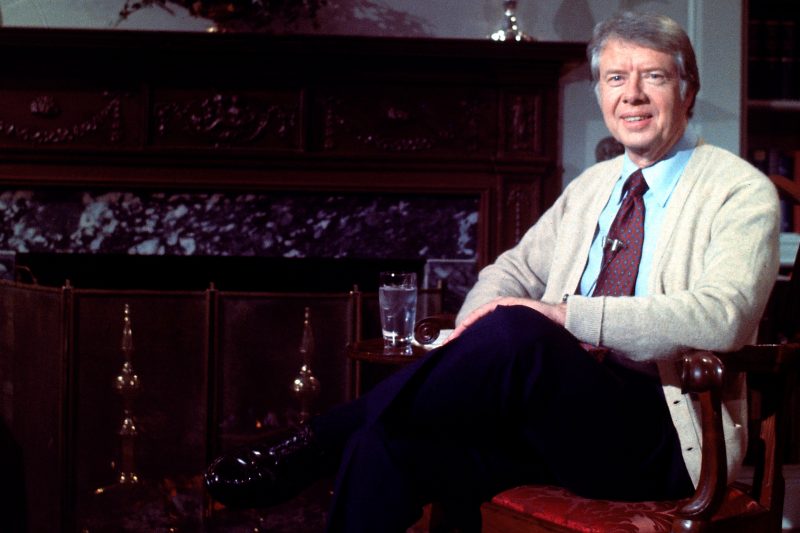Less than two weeks into his presidency, Jimmy Carter sat before a crackling fire in a cardigan sweater and asked Americans to make sacrifices in the face of natural gas shortages and a brutally cold winter.
The speech would be ridiculed and mischaracterized for nearly half a century. To this day, Republicans invoke it as evidence of what they call a defeatist Democratic Party, especially Carter’s exhortation for Americans to conserve energy by turning down the thermostat.
Yet the speech built on similar themes articulated by Carter’s two Republican predecessors, and it kicked off a landmark presidency for the cause of environmental conservation. Plus, it made a major fashion statement.
In the nationally televised Feb. 2, 1977, fireside chat, his first speech to the nation since his inauguration, Carter started off with his trademark earnestness.
“Tomorrow will be two weeks since I became president,” he said. “I’ve spent a lot of time deciding how I can be a good president.”
It was a time when the United States was overly dependent on foreign oil, and the new president said Americans “must face the fact that the energy shortage is permanent. There is no way we can solve it quickly.”
Then he issued this challenge: “All of us must learn to waste less energy. Simply by keeping our thermostats, for instance, at 65 degrees in the daytime and 55 degrees at night, we could save half the current shortage of natural gas. There is no way that I, or anyone else in the government, can solve our energy problems if you are not willing to help.”
Two weeks earlier, on Jan. 21, his first full day in office, Carter had previewed the conservation pep talk, issuing a statement urging Americans to lower the thermostat “to 65 degrees in the daytime and lower at night.”
Conservatives have mocked Carter’s message of self-sacrifice. Former House speaker Kevin McCarthy (Calif.) has said it inspired him as a 12-year-old to become a Republican.
“I was in the sixth grade, I turned on the TV, and I watched Jimmy Carter have a sweater on and tell me to turn the heating down,” McCarthy said in a record-breaking 8½-hour speech in 2021. “He told me that the best days were behind us, that as an American I had to accept less. That wasn’t how I was raised.”
Mostly lost to history is that Carter’s predecessor, President Gerald Ford, made a similar plea when he unveiled his ill-fated Whip Inflation Now (WIN) plan in a 1974 speech: “To help save scarce fuel in the energy crisis, drive less, heat less.” And the year before that, in response to severe energy shortages brought on by the Arab oil embargo of 1973, President Richard M. Nixon urged Americans to lower their thermostats by at least 6 degrees to achieve a national daytime average of 68 degrees.
But neither Republican president used a wardrobe accessory to reinforce their message. And many people have shorthanded Carter’s message to “Put on a sweater,” although he never told anyone to do that. (Even the Jimmy Carter Presidential Library erroneously tweeted, in recognition of the first day of autumn a couple of years ago, that the former president “encouraged Americans to turn the heat down to conserve energy and throw on a sweater instead!”) Instead, sitting in front of shelves stocked with books, Carter made the point more subtly by sporting a cardigan himself, over a shirt and tie, in a look that resembled a college professor’s.
“Obviously their motives are different but President Carter is doing for sweaters today what Lana Turner did for them in the 1940s,” Washington Post fashion editor Nina S. Hyde wrote in a story headlined “President Carter, the Sweater Man,” published on Feb. 5, 1977. “Probably not since the hey days of that Sweater Girl have Americans been so aware of people wearing sweaters.”
She added: “It’s not likely that Carter was wearing a sweater merely for the warmth it provided but rather to underscore the informality of his fireside chat and to put across his message of energy conservation. … He was wearing a V-neck wool cardigan, sometimes called a ‘grandfather sweater’ since it sells best as a Christmas gift for older men.”
Hyde quoted designer Ralph Lauren as saying that Carter “wore a sweater to establish his own identity. It should have an impact greater than a movie star on an athlete. It could change the etiquette of clothes.”
In 2012, Time magazine listed Carter’s sweater among its top 10 political fashion statements, noting that the magazine predicted in 1977 that the cardigan “may prove to be the most memorable symbol of an Administration that promises to make steady use of symbolism.” At the time, even an unnamed Republican “insider” grudgingly conceded, “He was folks, and folks is in. I hate to say it, but from a purely analytical point of view, I loved it.”
Not everyone was as enamored with the sweater, which drew its share of taunts. A 1978 “Saturday Night Live” skit, for example, featured Dan Aykroyd as a sweater-wearing Carter, giving a “plant-side chat” in honor of spring and urging Americans to burn 8 percent of their money to tamp down inflation.
In fact, Carter also addressed inflation and several other topics in his fireside chat, although the thermostat remains the enduring image. And while his focus on conservation was ahead of its time, not all of Carter’s energy proposals in that speech would pass muster with environmentalists today, including his plan to “stress development of our rich coal reserves in an environmentally sound way.”
Still, he did tout research on solar and other renewable energy sources and would install solar panels on the White House two years later. (Ronald Reagan then removed them.) Carter, who designated 56 million acres of Alaska wilderness as federally protected in 1978, is recognized today as one of the nation’s most consequential environmental presidents.
And when it came to conserving energy, Carter did as he preached, selling the presidential yacht the Sequoia and unplugging White House TV sets, according to PBS’s 2002 “American Experience” Carter documentary. In the film, his vice president, Walter Mondale, recalled with a laugh: “He turned off the air conditioners, and it was so hot in the White House, people would come in there — it was unbelievable. It would be a hundred above in there.”

